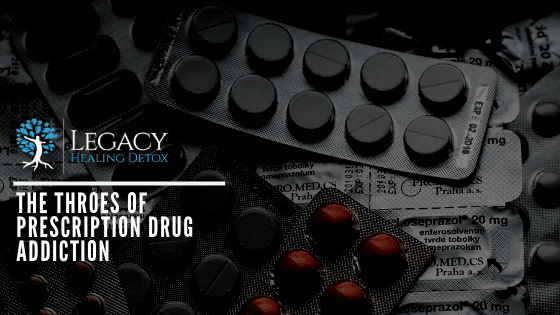
The Throes of Prescription Drug Addiction
Legacy Healing Center Blog
In the age of progressive medicine, where science seems to fix everything, we are seeing the rise in the occurrence of prescription drug addiction. Sometimes, patients fall victim to the subtle warning labels on the side of their prescription bottle, while others get caught up intentionally chasing the euphoria that many addictive pharmaceuticals can provide.
Once a person has begun misusing a prescription, addiction can quickly take hold and form a compulsive habit that is difficult to break. Prescription drug addiction can drive individuals to go doctor shopping, empty their bank accounts, begin buying illicit pharmaceuticals on the street, and even buying illicit substances when the pharmaceuticals run out.
Frequently Abused Prescription Drugs
Common prescription drugs of abuse include stimulants, opioids, and benzodiazepines. All of these classes of drugs have an effect on the central nervous system and are classified as narcotics with a potential for abuse. When taken against doctor’s orders, the chances of becoming addicted rise.
Stimulants, like Adderall, Ritalin, and Vyvanse are prescribed for attention deficit disorder (ADD) and attention deficit hyperactivity disorder (ADHD). However, amphetamine, the active ingredient in Adderall, works similarly to methamphetamine by decreasing appetite, increasing focus, and boosting energy levels. The euphoric rush of energy that one feels after taking a stimulant can easily become addictive. These drugs are commonly abused by high school and college students as “study drugs” causing more and more young people to fall victim to prescription drug addiction.
Opioids, including codeine, morphine, Vicodin, and oxycodone, are prescribed at alarming rates despite their high-risk potential for abuse. Opioids are prescribed to manage pain after surgery, injury, or chronic pain and they also have a sedative effect. Addiction to opioids can occur in as little as 7 days. In addition, the majority of people who are currently addicted to illicit opioids, like heroin, began their addiction by abusing prescription opioids.
Benzodiazepines and sedatives work to suppress the central nervous system. They are typically prescribed to treat anxiety or sleep disorders but are sometimes given as a sedative before surgeries or other medical procedures. Popular drugs in these categories include Xanax, Valium, Ambien, and Lunesta. People who are abusing benzodiazepines and sedatives may have serious memory issues and appear unusually drowsy. In addition, withdrawal can be dangerous and should not be attempted outside of a medical setting.
Signs of Prescription Drug Addiction
While prescription drug addiction may take longer to identify than illicit drug addiction, there are several tell-tale signs that may indicate that a person is addicted to their prescription medication.
- Mood swings
- Lack of energy or excess energy
- Constricted pupils or dilated pupils
- Slurred or rapid speech
- Memory issues
- Increased aggression, irritability, or depression
- Irregular sleeping habits
- Excess pill bottles in the home
- Crushing, snorting, or injecting pills that are meant for swallowing
- Withdrawal from friends and family
- Loss of interest in usual activities
- Doctor shopping
Consequences of Prescription Drug Abuse
Since the most commonly abused prescription drugs are addictive, repeated abuse of prescription medications can result in addiction, health problems, accidents, and legal consequences.
Prescription drug addiction is characterized by a physical dependency on a substance and a mental craving for the substance. Often, a person who is addicted to prescription medication will experience withdrawals when they stop taking the drug. This may cause a person to continue using even when they want to stop, maintain multiple prescriptions from different doctors, purchase these drugs illegally on the street, or begin using illicit substances such as heroin or methamphetamine.
Abusing prescription medications can also result in serious health issues. Opioids and benzodiazepines can lead to decreased cognitive function, infertility, slowed breathing, and seizures. In the event that an overdose occurs, abuse of these medications can be fatal. Stimulant abuse can trigger paranoia, increase body temperature, cause abnormal heart rhythms, increase the risk of cardiovascular problems, and trigger fatal seizures.
Due to the mind-altering effects of prescription drugs, misuse can lead to impaired thinking, decision making, and reaction time. This puts those who abuse prescription drugs at an increased risk of accidental injury when driving, operating machinery, or doing day-to-day activities.
Abusing drugs, legal or illegal, often leads to illegal activity. Even if the person has no criminal history, abusing prescription medication makes them more susceptible to engaging in criminal activity. This can potentially lead to jail time, a suspended license, or hefty monetary fines.
Recovery from Prescription Drug Addiction
Recovery often begins with addiction treatment and aftercare. If you or a loved one is ready to get sober from prescription medication, it is best to seek help from a medical detox in order to make the withdrawal experience as safe and comfortable as possible. After detox, it is ideal to participate in addiction treatment in order to provide the therapy and counseling necessary to prepare for a life in sobriety. Our addiction specialists will be with you or your loved one every step of the way so you can rest easy that the best possible treatment is being given.
Sources:
National Institute on Drug Abuse Prescription Stimulants